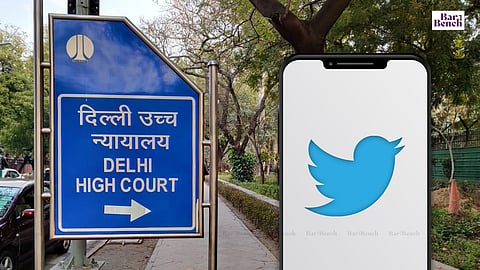
- Latest Legal News
- News
- Dealstreet
- Viewpoint
- Columns
- Interviews
- Law School
- Legal Jobs
- हिंदी
- ಕನ್ನಡ

Twitter has informed the Delhi High Court that being an intermediary, it cannot decide whether any content on its platform is lawful or not unless put to “actual knowledge” after determination by courts or the appropriate government [Aditya Singh Deshwal v. Union of India & Ors].
The social media giant said that “actual knowledge” has been interpreted by the Supreme Court in the Shreya Singhal case to mean either a court order and/or a notification by the government or its agency.
“This includes orders under Section 69A of the IT Act. Content that is notified to the Answering Respondent (Twitter) by way of a court order or by notification by the appropriate agency is then taken down. The Answering Respondent being an intermediary cannot decide whether content on its platform is lawful or otherwise unless it is put to such "actual knowledge”,” it said.
It further stated that another way content can be removed from Twitter is if it is violative of the platform's terms of service.
“…there is also a user agreement between the Answering Respondent and its users. The Answering Respondent by way of its Terms of Service prescribes that certain content that may be prohibited on its service, and that a user who has violated these Terms may be suspended or the content may be removed.”
This contractual right remains unfettered by the enactment of Information Technology (Intermediary Guidelines and Digital Media Ethics Code) Rules, 2021 [IT Rules 2021], Twitter's reply added.
Another point made was that the Delhi High Court was already considering whether or not a writ petition is maintainable against Twitter, and that the Bench in that case had already part-heard the matter.
The response has come in a Public Interest Litigation (PIL) by Advocate Aditya Deshwal highlighting that several objectionable posts were being made through a Twitter handle named Atheist Republic, and that despite several complaints, Twitter has neither suspended the account nor taken down the offending content.
The High Court had in March expressed its displeasure over Twitter's conduct and asked the social media platform why it did not take action and suspend accounts that post ‘blasphemous’ and objectionable content about Hindu gods and goddesses, when even the account of former United States President Donald Trump was suspended.
However, the US-based social media giant has questioned the maintainability of a writ petition against it, arguing that it is not a ‘State’ as defined under Article 12 of the Indian constitution.
It argued that it is a private intermediary and its services can be availed only upon the acceptance of its Terms of Service, subject to applicable law.
Deshwal’s petition was heard on Tuesday by a Division Bench of Chief Justice Satish Chandra Sharma and Justice Subramonium Prasad.
Senior Advocate Sidharth Luthra appeared for Twitter and stated that almost all the prayers in the petition have been met.
He said that an FIR has already been registered against the offenders, the offending posts have been taken down and the account has also been suspended.
The Court listed the case for further consideration on October 28.